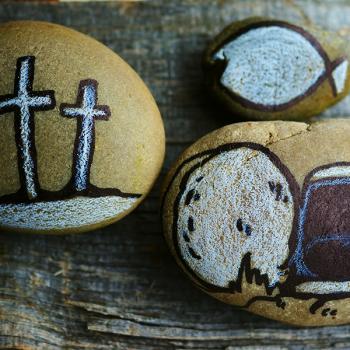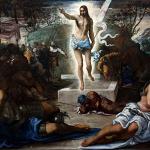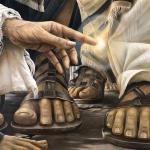As we discuss the atonement, it is vitally important that we come directly to the cross itself. There are two things for us to consider which, by necessity, require penal substitution.
The first is that the cross is absolutely essential in the purposes of God to save us. We have hinted at this previously, but if the cross was not an essential part of the plan of God for our salvation, allowing His Son to go through such suffering would be shameful and would, indeed, reveal a lack of love towards Him. Unless we believe that God’s justice demands judicial death for sin, it is difficult to understand why the cross was essential.
As the cross looms before Jesus, we are also faced with another immense problem — if penal substitutionary atonement is not true, why did it seem such a big thing to Jesus? While Jesus was brave and chose to go to the cross, many people throughout history have appeared to face death with more confidence than the Son of God in the Garden of Gethsemane. I believe we insult His dignity unless we understand that it was not merely death from which Jesus was instinctively recoiling.
Jesus cries out to His Father a prayer which is emotive in the extreme — “My Father, if it be possible, let this cup pass from me; nevertheless, not as I will, but as you will.” (Matthew 26:39)
The obvious implication is that it was NOT possible for the cup to pass, or at least not possible if God wanted to save us. This cup cannot possibly simply mean death on the cross; no, indeed, the cup is clearly the cup of God’s wrath spoken of in the Old Testament which Jesus would drain dry.
As Lloyd-Jones put it:
“Christ died upon the cross for no reason except this; it had to happen; it was an absolute necessity; there was no other way whereby man could be forgiven.” (God the Father, God the Son (315), Wheaton, Illinois: Crossway Books)
The writer to the Hebrews puts it as follows:
“Therefore he had to be made like his brothers in every respect, so that he might become a merciful and faithful high priest in the service of God, to make propitiation for the sins of the people.” (Hebrews 2:17)
And Paul says,
“For there is one God, and there is one mediator between God and men, the man Christ Jesus.” (1 Timothy 2:5)
In Mark’s account of this event, Jesus warns his disciples about what is about to happen to Him and them by referring to an interesting Bible verse: “For it is written, ‘I will strike the shepherd, and the sheep will be scattered.‘” (Mark 14:27)
It is clear who is the one doing the striking — it is God. Interestingly, at least in the ESV, the Old Testament verse this is quoted from is translated slightly differently in such a way that it seems that God is the one doing the striking, but through the agency of someone else.
“Awake, O sword, against my shepherd, against the man who stands next to me, declares the Lord of hosts. Strike the shepherd, and the sheep will be scattered.” (Zechariah 13:7)
This slight discrepancy in our English translation may, in fact, simply be a matter of differences with the Septuagint and the Hebrew, although approximate quotations were the norm in that culture. Nonetheless, to me, Jesus is clearly summarizing the quote in such a way that He is making it clear God will be the one striking Him. He could perhaps have quoted that verse in a slightly different way if He didn’t see it that way. So we have Jesus clearly saying that God is the one causing Him pain.
“The debt was so great that while man alone owed it, only God could pay it.”
— Anselm















